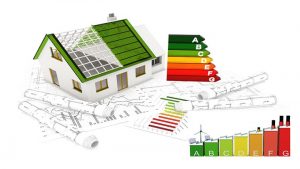Zamparas N. & Partners has carried out a significant number of energy inspections and research in the building sector as it has the necessary equipment and the necessary metering instruments as well as experienced human resources.
An energy efficiency study is the study that analyzes and evaluates the energy performance of a building.According to the Building Energy Efficiency Regulation (ΚΕ.Ν.Α.Κ.), since October 1, 2010, for the issuance of a building permit for each new or radically renovated building with a total surface area of more than 50 m², it is necessary to prepare and submit an Energy Efficiency Study to the relevant Urban Planning Service. It is an additional study necessary for the issue of a building permit and replaces the heat insulation study, as it was before the new regulation was implemented.
 According to the new legislation (DSS No D6 / B / House No 5825, Government Gazette 407 / 9-4-2010), each building has to meet certain minimum energy efficiency requirements. This is achieved through the observance of minimum specifications, according to the legislation, regarding the design of the building, the thermotechnical characteristics of the shell elements and the technical characteristics of the electromechanical installations (heating, cooling, air conditioning, ventilation, lighting, hot water). Design elements are introduced into special energy analysis software and the final primary energy consumption is calculated and the building is compared to a reference building with similar geometric characteristics and is classified into an energy class, which will be confirmed by the energy inspection.
According to the new legislation (DSS No D6 / B / House No 5825, Government Gazette 407 / 9-4-2010), each building has to meet certain minimum energy efficiency requirements. This is achieved through the observance of minimum specifications, according to the legislation, regarding the design of the building, the thermotechnical characteristics of the shell elements and the technical characteristics of the electromechanical installations (heating, cooling, air conditioning, ventilation, lighting, hot water). Design elements are introduced into special energy analysis software and the final primary energy consumption is calculated and the building is compared to a reference building with similar geometric characteristics and is classified into an energy class, which will be confirmed by the energy inspection.
Once the construction of a new building or the overhaul of an existing building has been completed, the owner is required to request the issue of an energy performance certificate. When selling or renting buildings, the owner or the lessee is provided with an energy performance certificate. The energy performance certificate for a building is issued by energy inspectors, and is valid for a maximum of ten (10) years. If the building undergoes a radical renovation or addition to an extent that affects its energy performance, the validity of the building's energy performance certificate expires at the time of completion of the renovation or addition.
 The certificate includes special sizes of final and primary energy consumption as well as reference values that allow the consumer to compare and evaluate the energy performance of his building. At the same time it is accompanied by recommendations for improving the energy performance of the building, in relation to the costs involved.
The certificate includes special sizes of final and primary energy consumption as well as reference values that allow the consumer to compare and evaluate the energy performance of his building. At the same time it is accompanied by recommendations for improving the energy performance of the building, in relation to the costs involved.
